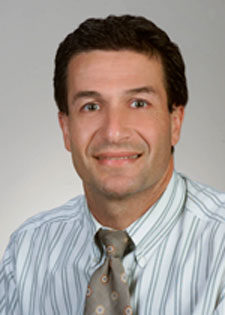No, we cannot just present your slide deck
University of South Florida neurologist Selim Benbadis, MD, is lead author of a provocative letter to the pharmaceutical industry titled “No we cannot just present your slide deck …,” which was published online Sept. 15 in the journal Epilepsy & Behavior.
Dr. Benbadis directs the Comprehensive Epilepsy Program at USF and Tampa General Hospital. Signing the letter to the editor with him were neurologists from large academic epilepsy centers at Columbia University, Emory University, the Mayo Clinic, Jefferson University and the University of Texas.

Dr. Selim Benbadis
Recently, the pharmaceutical industry – under increasing pressure from the FDA — has strictly enforced regulations requiring faculty who speak at company-sponsored programs to exclusively present company slides.
“There is near-unanimous agreement that the present rules for promotional programs are a disservice to our colleagues, trainees and patients,” the authors write. “We are educators who aim to improve medical care. We cannot simply present a company’s slide deck, which often contains messages that are more appropriate for a salesperson than an independent physician… We want to educate physicians more broadly, and believe it can be done ethically and legally while still delivering a useful message for both sides.”
A growing number of academic physician leaders are against faculty participation in any pharmaceutical industry-sponsored activities in light of concerns that it may influence patient care, including drug prescribing practices, and blur the line between research and marketing. The authors acknowledge that several universities and institutions now explicitly prohibit pharmaceutical industry-prepared slides, allowing faculty to participate only in CME lectures.
While the “dinner program” talks are not a substitute for more comprehensive CME activities, the authors contend they fill an educational gap for many practicing physicians “who cannot attend neurology department grand rounds and would otherwise have no opportunity for informal and personal interactions with subspecialists.”
The authors suggest several options that might serve as a compromise while remaining within FDA regulations. Their preference is for pharmaceutical companies to provide unrestricted educational grants to CME-granting institutions (universities, hospitals, etc) for educational programs for physicians.
“There needs to be more serious discussion of this problem, which is not specific to epilepsy or even neurology. It affects all academic faculty who do speaking sponsored by companies,” Dr. Benbadis said.

